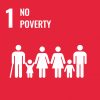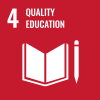Faya, 15 Nov 2021 – In Faya, the largest city in the Saharan Chad, 30 youths recently embarked on a life-changing learning journey as part of the International Organization for Migration’s (IOM) first-ever Technical and Vocational Training (TVET) programme in the north of the country. The programme was developed to bridge the skills gap for rural Chadian youth and empower them with the resources they need to succeed.
Mostly rural, the north of Chad (including the Borkou, Western Ennedi and Tibesti provinces) has some of the country’s lowest human development indicators. Low literacy rates combined with limited offerings in terms of technical and vocational skills training have resulted in high rates of unemployment and underemployment among youth.
“Today, if you don’t know how to use a computer, you cannot have a good job,” says Ache, 32, one of the computer literacy students participating in the TVET programme. “That is why I chose to learn computer skills, to have a better future.”

Hamid, 23, takes a six-month electricity training as part of IOM’s TVET programme in Northern Chad. The programme includes on-hands learning on solar panels maintenance. Photo: IOM/François-Xavier Ada-Affana
A mother of three, Ache, 32, has juggled several low-paying jobs since she got married.
“When you look around the city, you see a lot of men working in offices. This is because us women never had the opportunity to learn the required skills. So, I am happy to be taking this course. I will go as far as possible and earn a diploma which will open doors for me,” she says.
Because of the lack of opportunities to learn employable skills and a slow job market, some of the youth decide to leave either towards Libya, sometimes even to Europe, in search of better living conditions.

The first group of electricity students of the rehabilitated Faya Vocational Training Centre. The Centre was rehabilitated by IOM with support of the UN Peacebuilding Fund to upskill youths in Northern Chad and empower them to become socio-economically resilient. Photo: IOM/François-Xavier Ada-Affana
This was the case of Hamid, a 23-year-old man who dropped out of school in 2014 when he was 16 to follow friends who were migrating to Libya.
“We were told we would find a good job there, so we left without even telling our parents,” Hamid recounts.
After four unsuccessful journeys to Libya, Hamid decided to stay back home but he was faced with a dilemma. “I could not go back to high school because I was too old compared to the others,” he explains.

A computer room was set up in the rehabilitated Faya Vocational Training Centre to help youth acquire computer skills. Photo: IOM/Andrea Ruffini
For him, the TVET programme was a lifesaver. “When I heard about the skills training programme, I applied to study electrical engineering because I saw it as an opportunity gain a skill and to reinvent myself,” he says.
The TVET programme allows local youth to take up to six-months-long diploma courses in basic computer literacy, French language literacy, sewing, fundamentals of electrical engineering including solar panel repair, and auto mechanics.
Women and girls, who make up nearly half of the population in these three provinces, are predominantly underemployed due to the lack of opportunities to acquire key skills for their socioeconomic autonomy.
Ache, 33, follows a computer science course. Photo: IOM/Andrea Ruffini
“Most young girls are married after high school and cannot continue learning. This is why they are among the most unemployed or underemployed,” explains Mahamat Allatchi, the director of the Faya Technical and Vocational Training Centre.
The centre is the only such infrastructure in Northern Chad and was rehabilitated by IOM as part of the TVET programme.
“The centre was established in 2009 but because we did not have a functioning space or any equipment, it remained deserted,” says Allatchi. “Now that it has been rehabilitated, equipped and some teachers have been hired, we are seeing a growing interest among youths to learn new skills. This gives me hope,” he adds.
The first cohort of the TVET programme will graduate in February 2022.

The rehabilitated Faya Vocational Training Centre. Photo: IOM/François-Xavier
The TVET programme in Northern Chad is part of the project “Empowering youth to become peacebuilding agents” funded by the UN Peacebuilding Fund and jointly implemented by the International Organization for Migration (IOM) and the World Food Programme (WFP) in Chad.
This story was written by François-Xavier Ada, Communications Officer with IOM Chad.



